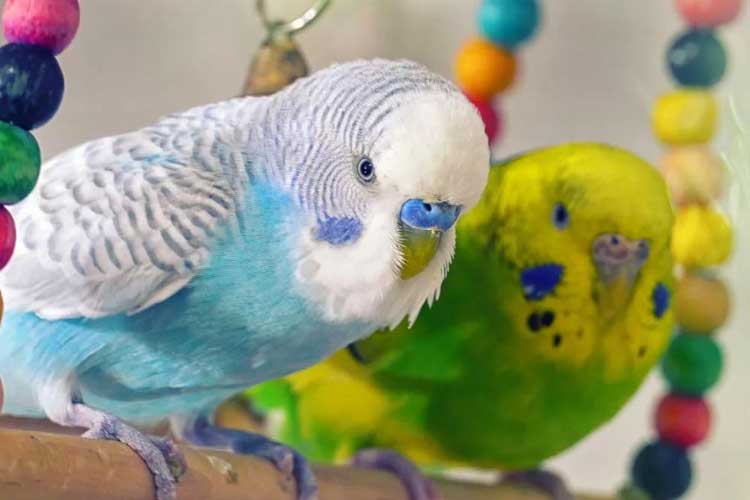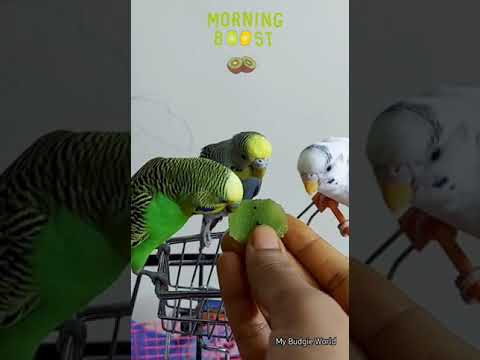Do your budgies enjoy eating fresh fruits? However, you are scared of feeding them kiwi fruit because you are not sure if it is safe. This guide covers everything you may need to know about feeding your budgie a kiwi fruit.
So, can budgies eat kiwi? Yes. Budgies can eat kiwi fruit, including its skin and seeds. The fruit is easily digestible, nutritious, and has a rich taste that these aviary birds love. However, they must consume the fruit in moderation, or it could upset their digestion.
Having said that, you probably would like to know, are there benefits of budgies eating kiwi? Continue reading to find out this and even how much of this fruit to give to your feathered companion.
Can You Feed Kiwi to Budgies?
Yes, you can feed kiwi fruit to your budgies. Also known as budgerigar or parakeet, budgies enjoy eating kiwi fruits because of their sweet-tart flavor. In fact, you can feed these seed-eating birds all parts of the kiwi, including the flesh, skin, and seeds. The seeds are relatively small for your budgies to choke on and don’t contain any poisonous compounds like apple seeds.
Similarly, kiwi skin is safe for your parakeet as long as the fruit has not been sprayed with pesticides. So, if the fruit is not organic, you should not feed the skin to your feathered companion as it could make the bird sick. This is because all bird species are exceedingly sensitive to chemicals like herbicides and pesticides.
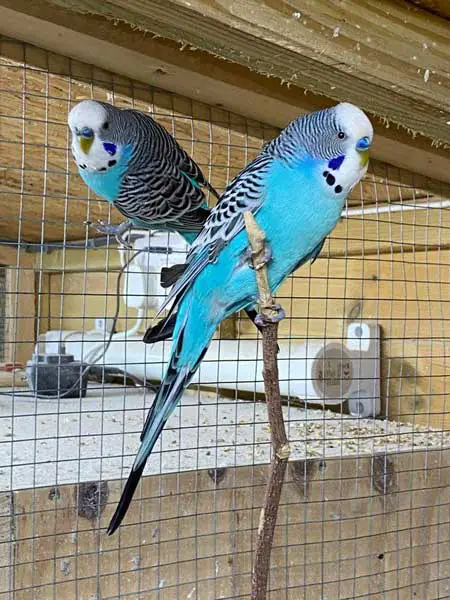
Now, while you can feed kiwi to budgies, you have to do it in moderation. Too much of this fruit could upset your parakeet’s digestion because kiwi is very high in fiber. Your pet may end up suffering from diarrhea. In other words, you should give the fruit to your bird as occasional treats.
The best part about feeding kiwi to budgies is how nutritious they are. You see, this fruit is packed with lots of nutrients, including:
- Vitamin E
- Vitamin K
- Folate
- Potassium
- Fiber
- Antioxidants
Therefore, adding kiwi fruit to your bird’s pelleted food can be a healthy dose. It can help keep your pet’s plumage healthy and also shiny. You just cut the fruit into small chunks and place a few on a dish in their cage. Just don’t feed your mature budgies the entire kiwi fruit.
That said, when you feed kiwi to your parakeets, you must dispose of the remains after two hours. The uneaten berry in the cage may grow bacteria if left longer, making your budgies sick once they eat them.
Do Budgies Like Kiwi?
Yes. Besides salad vegetables, budgies also like feeding on kiwi and other types of fruits. This is because the kiwi fruit packs a lot of flavors and mature budgies like treats with intriguing savors and textures. Even better, this favorite fruit is highly nutritious and easy to eat, even for young parakeets.
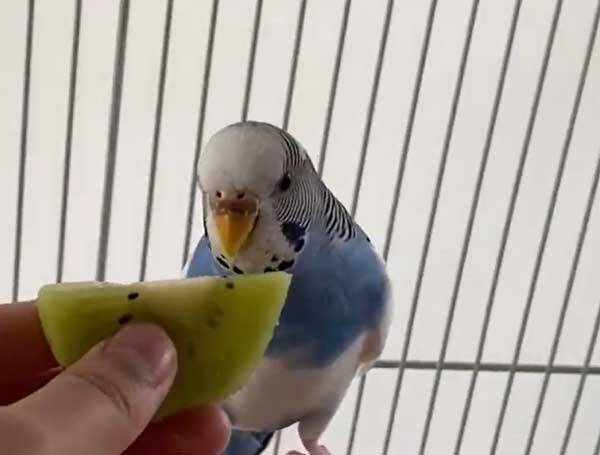
Health Benefits For Budgies Eating Kiwi
Surprisingly, kiwi fruit’s health benefits for budgies are the same as that for humans. We are talking about health benefits such as:

Digestive health
The main benefit of feeding your beautiful feather friends this nice treat is that it helps improve digestion. Simply put, it helps prevent issues like constipation and diarrhea. This is because the fruit is very rich in dietary fiber.
Maintaining plumage health
The plumage is simply the budgies’ layer of feathers. Eating kiwi helps maintain a shiny and healthy plumage.
Boosting immunity
This tasty treat also contains high amounts of vitamin C. When combined with the high antioxidants in kiwi fruit, it helps enhance your budgie’s immunity.
Heart and bone health
Kiwi fruit is a rich source of potassium, vitamin E, and protective polyphenols. This makes it effective in maintaining healthy functioning bones. It also improves your pet’s heart health.
Eye health
Additionally, this nice treat contains carotenoids like lutein designed to promote overall eye health. Therefore, it may help protect your budgies from eye diseases.
How Much Kiwi Should Budgies Eat?
Your parrot’s balanced diet should include 10 to 15% of fruits and vegetables. For kiwi fruit, one or two thumbnail-sized pieces per day, a couple of times per week, should be enough. So, don’t try giving a whole berry because too much of it is not okay for your pet friend.
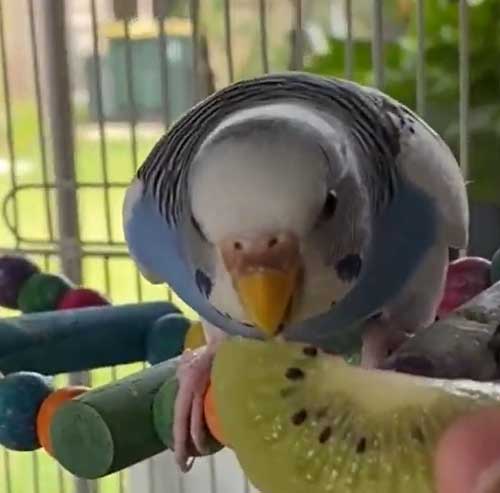
How Do You Prepare Kiwi for Budgies?
You start by washing these awesome treats thoroughly with fresh water to eliminate any pesticide residue on the skin. Then, slice the fruit into small pieces and mix them on a separate dish.
Alternatively, you could place kiwi bits in a string and suspend them inside the cage. As for the peels and seeds, you can choose to remove them or not based on your personal preference. After all, they are also safe and nutritious for all parrot species.
Can You Feed Kiwi to Baby Budgies? If so, how?
Yes. Once weaned, you can feed this special treat to your baby budgies. You simply chop the fruit into small-sized chunks. Then, hand-feed the pieces to your baby parrot. However, it is advisable to peel the skin because it is not very soft until the babies are old enough to eat it. You might also want to extract the seeds.
Video Of a Budgie Eating Kiwi
From the short video below, you can see how much the budgies are enjoying being hand-fed kiwi fruit.
What Other Fruits Can You Feed Budgies Apart From Kiwi?
Budgies enjoy eating a variety of fruits and salad vegetables. You can feed them mangoes, cherries, all varieties of melon, nectarines, bananas, apple pieces, and even grapes.
However, when feeding them cherries, you must get rid of the stone. As for the apples, you must remove the seeds because they contain cyanide, which is dangerous for parakeets. Other juicy fruits include:
- Strawberry and blueberry
- Peach
- Apricot
- Watermelon
- Oranges
- Lemon
FAQ
In this section, we will respond to some commonly asked questions about budgies eating kiwi fruits. Check them out.
Kiwi is an all-in-one fruit containing many nutrients such as fiber, folate, and potassium. Therefore, feeding the fruit to your parakeet can help meet its nutritional requirements. Besides, it contains a relatively low sugar content.
Yes. Budgies can eat the whole kiwi fruit, including the seeds, skin, and flesh. It boasts awesome nutrition. Unlike apple pits which are deemed poisonous, kiwi seeds are very nutritious.
If your pet bird refuses to eat kiwi, you can try clipping a few chunks to the side of the cage. Alternatively, you can let your feathered friend watch you eat the fruit. This way, they will be convinced it’s safe.
Outro
Certain food items are not safe for budgies. However, fruits like kiwi are very healthy because they are a source of vitamins. Therefore, you can feed your feathery friend any part of this special treat. Besides, the fruit does offer so many health benefits for budgies, including enhancing their immunity.
Even so, it is recommended your budgerigar eats kiwi in moderation, approximately 1-2 thumbnail-sized chunks a day. And when preparing the fruit for this bird species, you must wash it properly using clean water.
Do you know if your budgies can eat chia seeds or kale? Read our articles about it to learn more.
